

The weather these last few days has been very warm and The English Apple Man has been feeling it. Taking a step outside into our garden after lunch it has felt like an oven!
Ensuring our garden plants have enough water means spending half an hour before supper watering the most needy plants, in particular the hanging baskets which dry out so quickly and if not looked after never full recover.
 So when deciding what to write about this week, my thoughts turned to our British growers and the apple and pear orchards suffering in this heat.
So when deciding what to write about this week, my thoughts turned to our British growers and the apple and pear orchards suffering in this heat.
What triggered me targeting 'irrigation technology' as the subject of this week's Journal?
While checking LINKEDIN for stories of interest earlier this week I came across Antony Yousefian Ag-Tech Director of BARDSLEY ENGLAND talking about Phytech technology in operation in their apple orchards.
The English Apple Man as a former grower with 60 years of growing experience, including that fateful year of 1976 when our trees suffered with 'no rainfall' from June 1975 until September 1976, that summer is seared upon my mind!
We had no irrigation and the consequences were awful: a crop of small apples in 1976 and a very light crop in 1977 due to the stress of 1976 and a frost in the spring of 1977.
In today's modern orchards, trickle irrigation is 'in place' from day one! The huge investment in modern intensive orchard demands irrigation as standard.
So, how do we know what water is needed in the varying conditions of a British Summer?
By determining the level of Evaporation and Transpiration the amount of irrigation can be calculated.
EVAPOTRANSPIRATION
Evapotranspiration (ET) is the loss of water from a vegetative surface through the combined processes of plant transpiration and soil evaporation (ET is equivalent to and frequently referred to as consumptive use). Both environmental and biological factors affect ET. Important environmental factors include solar radiation, temperature, atmospheric dryness (vapor pressure . (ET) is the loss of water from a vegetative surface through the combined processes of plant transpiration and soil evaporation (ET is equivalent to and frequently referred to as consumptive use). Both environmental and biological factors affect ET. Important environmental factors include solar radiation, temperature, atmospheric dryness (vapor pressure .
The Video below gives an understanding of how EVAPOTRANSPIRATION works!
Click on EVAPOTRANSITION Video for an explanation of the method for determining irrigation demand.
Well, as a 'senior citizen' with not much left of my 7th decade left, I am not pretending I fully understand the systems in place and the refinements in technology which now make the simple equation: " how much water do we need?" into "what is the optimum water require to deliver high quality fruit without excess water?"
Precision irrigation will be an integral part of growing, indeed it is an essential element of every new orchard planted and has been vital part of soft fruit production for nearly two decades.
Key research into water efficacy has been one of the many successes at NIAB/EMR:
 Dr. Mark Else has developed an understanding of a plant's water requirements and this valuable research has drastically reduced the amount of water applied without any detrimental affect on the yield and quality of the fruit, indeed the research shows adding water without an understanding of the plants requirements is not only 'wasteful' but detrimental to the quality of the fruit.
Dr. Mark Else has developed an understanding of a plant's water requirements and this valuable research has drastically reduced the amount of water applied without any detrimental affect on the yield and quality of the fruit, indeed the research shows adding water without an understanding of the plants requirements is not only 'wasteful' but detrimental to the quality of the fruit.
In April 2012 The English Apple Man joined fellow members of BIFGA for a farm walk at East Malling Research (now NIAB/EMR) where among the many interesting talks Dr. Mark Else talked about his water use efficiency project.
Dr. Mark Else - Application of water research on pear growing.
"Developing water, and fertiliser saving strategies, to improve fruit quality and sustainability of irrigated high intensity, modern and traditional pear production"
Amazingly, the rain held off for Mark's presentation in the Concept Pear Orchard where key research is ongoing!
This is the objective summary of Mark's research and with forecasts of climate changing influence on water availability, this research is a key element in our ability to produce high yields of quality pears.
Mark told us the canopy structure of the different high intensity systems, can be expected to result in very different irrigation requirements. In this HDC funded work (Horticultural Development Council) - now renamed AHDB (Agriculture and Horticulture Development Board)
"we are developing targeted irrigation strategies to optimise water use efficiency, yields and fruit quality for each growing system" be it; V system, double leader or single leader 'run through' in practice this meant using Irrigation test regimes (ITR's) in 2011 based on soil matric potential that match demand with supply and reduce losses of water and fertiliser past the rooting zone.
The effects of the ITR's on shoot extension growth and fruit quality are currently being determined. In addition the consequences for shelf life potential are being assessed in on-going work funded by AG Thames. The impacts of the ITR's on return bloom will be assessed in the spring of 2012.
During 2012 the ITR's will be applied from six weeks after petal fall until September.
The research will provide guidelines enabling growers to optimise water and nutrient use efficiencies in modern and high intensity growing systems on different soil types in our UK pear orchards.
In March 2014 Mark presented the latest news on 'Sustainable irrigation of high-intensity tree fruit orchards'
HDC Projects: TF198 - Conference Pears; 2011-2013 & TF210 - Braeburn and Gala; 2013-2016 seek the answers to 'improving use efficiency product quality' by targeting 'efficient irrigation scheduling' - 'matching demand with supply' - 'increasing water and fertiliser productivity' - 'improving substrate water holding capacity' - 'scheduling tools for growers'
Using deficit irrigation regimes; RDI (regulated deficit irrigation) and PDI (partial root drying) novel irrigation regimes - manipulating 'in planta' chemical signals to develop improved quality and shelf-life of product, the research seeks the optimum use of water.
Below data from HDC (now AHDB) website
76% of growers in England and Wales farm in areas currently classified as being under 'water stress'. With additional pressures resulting from climate change and the need for greater production agricultural water demand is predicted to increase from between 25% to 180% of current demand by the 2050's, at a time when its availability for horticulture is becoming limited.
Many growers continue to apply 'insurance' irrigation to high value crops but with rising costs and the potential for run-off of fertilisers and pesticides to pollute ground and surface waters current practices are unsustainable.
A new water saving 'irrigation test regime' (ITR) was developed for 'high intensity' pear production' in Project- TF198. Water savings of over 50% have been achieved compared to 'commercial controls' (CC) without loss of yield or quality.
In July 2015 The English Apple Man visited Boxford Farms in East Anglia where some very forward thinking technology was being used to determine optimum water and nutrient requirements!
The Bibaum was of particular interest to E&SFGS Members with plantings of both Apple and Cherry; some of the first twin stems to be planted in the UK are now in full production and being fed and watered by an Autoagranom irrigation system.
Below: the 'twin stems' of a Bibaum tree - and the Autoagronom controls
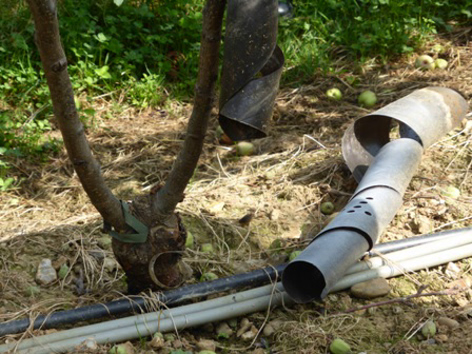
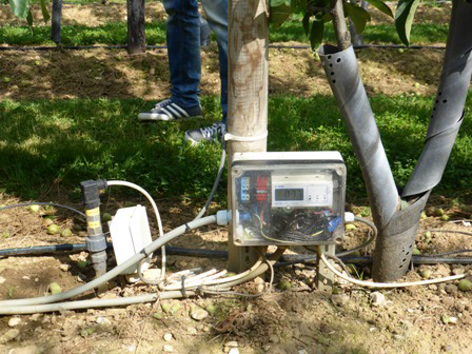
Below: A passage from Autoagronom website...
"Autoagronom's systems sample and monitor, in real-time, the chemical and physical changes in the upper levels of the root zone. Using various sensors (tensiometers, oxygen, pH and conductivity, and Nitrate calculations) each system collects data from the soil; performs computerized analysis; and, by utilizing fuzzy-control algorithms, automatically activates irrigation and fertilization".
Click on AUTOAGRONOM
In addition to the precision 'fertigation' system, another piece of technology is used to monitor the growth of an apple on an 'ongoing basis' - clever stuff the Phyto-sensor - F1MM as in some cases, the fruit may lose water that is manifested in deceleration of growth rate or even shrinkage of the fruit. It may be a result of water stress, lack of light, or another limiting factor (quote from website) or as Robert put it; fruit may grow by a millimetre in the day, but lose 1/2 a mill overnight.
Below: left; the Phyto-sensor in action and right; Phyto-sensor controls
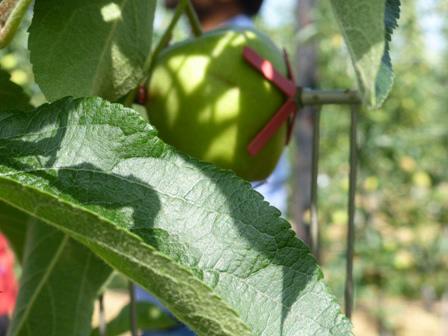
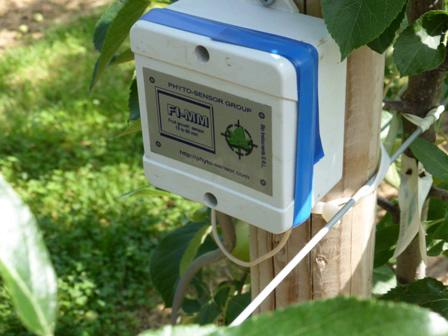
Click on Phyto-Sensor
 As mentioned, while scrolling through Social Media this week The English Apple Man came across Antony Yousefian Ag-Tech Director of Bardsley England and Co-founder of Bardsley X, passionate about change, innovation and accelerating technology adoption, walking through their orchards explaining how with modern technology they can optimise the irrigation onto another level using Phytec Technology.
As mentioned, while scrolling through Social Media this week The English Apple Man came across Antony Yousefian Ag-Tech Director of Bardsley England and Co-founder of Bardsley X, passionate about change, innovation and accelerating technology adoption, walking through their orchards explaining how with modern technology they can optimise the irrigation onto another level using Phytec Technology.
Antony: "This weather - From super wet to super dry, but we are able to save water by making decisions looking at the data from the tree not the soil. In his Video Antony explains how using Phytech - Plant-Based Farming sensors in one of youngest orchards, helping to drive their tree intelligence and decision making.
Antony Yousefian Ag-Tech Director's prime objective as part of The BARDSELY X project is to create a digital framework enabling BARDSLEY ENGLAND orchards to be fully automated in the next 10 years.
This is an exciting and technology dependent project which The English Apple Man will expand on during the course of this summer
Below: a new sensor application for Phytech
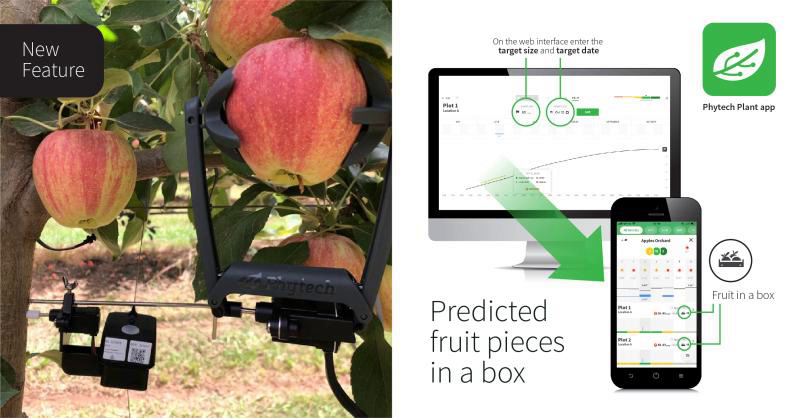
Phytech's - PlantBeat technology is a simplified, alert-driven mobile platform which combines predictive algorithms and data analysis tools that integrate continuous crop health and supportive environmental data, distilled into real-time recommendations.
Mark Sherfy, A water resources manager & Agtech specialist in California, explains Phytech's benefits: "By Using Phytech we were able to cut 20% of our water requirements. That's immense....
Click on Video as Mark Sherfy explains the benefits of Phytech's sensory system.
Click on PHYTEC for more information.
It is now nearly 10pm on Friday 26th June and while still warm, the fresher air is creeping in!
That is all for this week
Take care
The English Apple Man